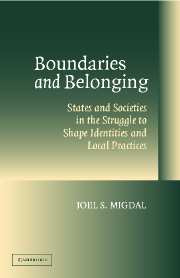 Boundaries and Belonging
Boundaries and Belonging Book contents
- Frontmatter
- Contents
- List of Contributors
- Preface and Acknowledgments
- PART I INTRODUCTION
- PART II ON THE EVE OF THE NATION-STATE: THE OTTOMAN EMPIRE
- PART III THE STATE AND “DANGEROUS POPULATIONS”
- PART IV INSCRIBING MEMBERSHIP AND CONTESTING MEMBERSHIP IN THE NATION
- PART V BEYOND THE STATE: TRANSNATIONAL FORCES AND THE CHALLENGE TO THE STATE
- 11 Passports into Credit Cards: On the Borders and Spaces of Neoliberal Citizenship
- 12 Contested Boundaries: Citizens, States, and Supranational Belonging in the European Union
- 13 Boundaries of the Nation-State and the Lure of the Islamic Community in Turkey
- PART VI CONCLUSION
- Index
13 - Boundaries of the Nation-State and the Lure of the Islamic Community in Turkey
Published online by Cambridge University Press: 25 July 2009
- Frontmatter
- Contents
- List of Contributors
- Preface and Acknowledgments
- PART I INTRODUCTION
- PART II ON THE EVE OF THE NATION-STATE: THE OTTOMAN EMPIRE
- PART III THE STATE AND “DANGEROUS POPULATIONS”
- PART IV INSCRIBING MEMBERSHIP AND CONTESTING MEMBERSHIP IN THE NATION
- PART V BEYOND THE STATE: TRANSNATIONAL FORCES AND THE CHALLENGE TO THE STATE
- 11 Passports into Credit Cards: On the Borders and Spaces of Neoliberal Citizenship
- 12 Contested Boundaries: Citizens, States, and Supranational Belonging in the European Union
- 13 Boundaries of the Nation-State and the Lure of the Islamic Community in Turkey
- PART VI CONCLUSION
- Index
Summary
Crosstalk
I cannot redraw all the borders of myself
however they divide and separate
I cannot unlearn all the markers of MY WORLD
whatever their origins (or destinations)
there's always residue
what I can't excise
I carry borders and markers wherever I am
Local or global here or there
I cannot talk across them all always
Ailbhe Smyth, “Borderline Crosstalk,” in Knowing Feminisms (1997)This chapter is about the attempt to “redraw borders” of ourselves, “unlearn” markers of our world, and “talk across” borders and markers. I focus on the Turkish Islamist attempt to construct an alternative community to that of the nation, by using the tool of the nation-state. In its inception, the Turkish nation-state established its borders and authority in opposition to the religious groups that prevailed in the country. The secular nation-state redrew the boundaries of Islam in public space in its struggle to claim its territorial hegemony. Ironically, in contemporary Turkey, the Islamist groups used the public space and the political democracy that the nation-state legitimized within its territorial boundaries to herald the Islamist call. The translocal solidarities and norms that Islamists appealed to could best be cultivated in the context of the political arena the nation-state needed to legitimize its secular rule. Ultimately, the Islamists in Turkey who envisioned crossing territorial boundaries of the nation-state could hope to realize their own political ambitions within these borders they criticized.
- Type
- Chapter
- Information
- Boundaries and BelongingStates and Societies in the Struggle to Shape Identities and Local Practices, pp. 318 - 336Publisher: Cambridge University PressPrint publication year: 2004
- 1
- Cited by


